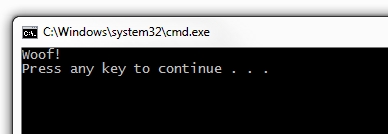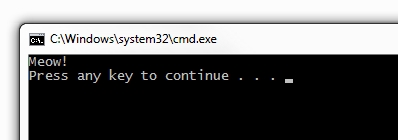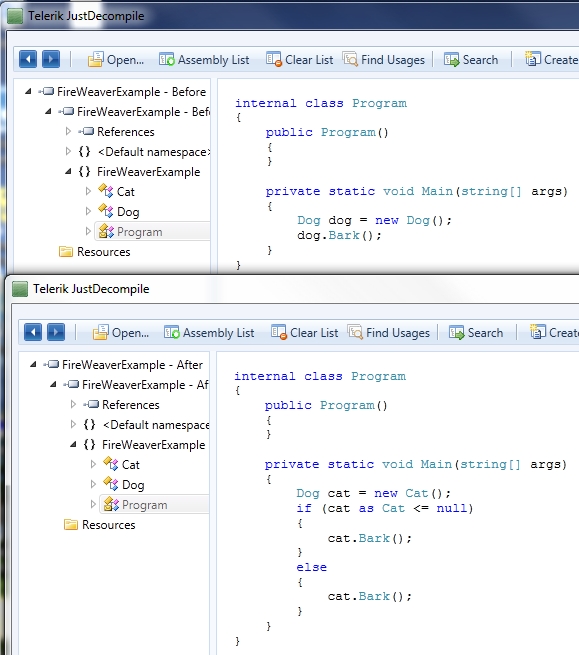Posts tagged with 'F'
This week, there's a Manning Publishing promotion brought to you by my friends at PostSharp! This week of deals will bring you 50% off of a whole bunch of great .NET and/or AOP related books, including mine. You'll also get free excerpts from each book, so you can try before you buy.
Today, you can get my book, AOP in .NET, for 50% off, using code dotd0819au.
These are the Promotional Codes that will be active all week:
Day One: Save 50% on C# in Depth, Third Edition and Real-World Functional Programming. Enter pswkd1 in the Promotional Code box when you check out. Expires midnight ET August 20. Only at manning.com.
Day Two: Save 50% on AOP in .NET and AspectJ in Action, Second Edition. Enter pswkd2 in the Promotional Code box when you check out. Expires midnight ET August 21. Only at manning.com.
Day Three: Save 50% on ASP.NET MVC 4 in Action and ASP.NET 4.0 in Practice. Enter pswkd3 in the Promotional Code box when you check out. Expires midnight ET Aug 22. Only at manning.com.
Day Four: Save 50% on Metaprogramming in .NET and DSLs in Boo. Enter pswkd4 in the Promotional Code box when you check out. Expires midnight ET Aug 23. Only at manning.com.
Day Five: Save 50% on Brownfield Application Development in .NET and Continuous Integration in .NET. Enter pswkd5 in the Promotional Code box when you check out. Expires midnight ET Aug 24. Only at manning.com.
Day Six: Save 50% on Windows Store App Development and Windows 8 Apps with HTML5 and JavaScript. Enter pswkd6 in the Promotional Code box when you check out. Expires midnight ET Aug 25. Only at manning.com.
So, if you are a .NET developer, a web developer, or just trying to learn some more skills, this is the week for you!
This is the last post of a series of posts about using ASP.NET's ActionFilter.
The last method that you can override in an ActionFilter is OnResultExecute, which runs after the result of a controller action has been executed.
An argument of type ResultExecutedContext gets passed in to OnResultExecute. It's not wildly different from ResultExecutingContext, except that instead of a "Cancel" member, you get a "Canceled" member, which just tells you after the fact if the action was cancelled or not. You can still access HttpContext, the Controller object, the Result, the RouteData, etc.
I can't really create another kitchen sink view like I could with the previous blog posts, because the ActionResult (usually a ViewResult) has already been executed. (I could still write to the Http Response, but that would be a little tedious).
Since OnResultExecuted can't output to the view, it's somewhat limited in its general usefulness. Logging, of course, can still be done here. Last minute changes to the HttpResponse might be a good use of this filter. You can still handle some exceptions, though using a HandleErrorAttribute filter might be a better idea for that.
I've been trying on and off to figure out Mono.Cecil, and so far it's not very encouraging. It's a bit above my pay grade, it seems.
But all is not lost: I came across a tool while browsing NuGet called FireWeaver. It sits on top of Mono.Cecil, which means it does its work after compilation. It provides you with a way to replace a class with an entire other class. So it's not exactly intercepting or proxying classes, the way other AOP frameworks do: it flat out replaces it and is "essentially duct typing(sic) the entire object definition". I don't know if that's supposed to be "duct taping" or "duck typing", but I rather like the term "duct typing".
Here's a quick example of how it works, taken from the FireWeaver CodePlex site. First, I added FireWeaver with NuGet. Then I created a console app like this:
Compile and run as normal and here's the output:

Next, run the FireWeaver.Bootstrapper.exe tool against your assembly/assemblies. In my case, my Replace class is in the same assembly as the class it's replacing, so my arguments are identical, but you could certainly specify another assembly as the second argument:
And here's the output of the console app after I ran FireWeaver.

And here's what the assemblies look like (decompiled) before and after FireWeaver. Warning, your head may explode:

I'm just as confused about Cecil looking at these JustDecompile screenshots as I was before. But I assure you, it does work.
There's definitely some potential here, since this is a pretty easy tool to use, and integrating FireWeaver into your build script(s) shouldn't be too difficult if you don't want to hit the command line after every build. And it almost looks like pure duck typing brought to C#.
But this could also lead to some really wild code if you aren't careful with it. "Dogs and cats living together, mass hysteria" code.
Another week, another weekly concerns.
- Reza Ahmadi uses PostSharp to create a timing aspect.
- Part 1 of a series on AOP in Java with Spring.
- AspectJ with Scala from Jonas Boner.
- Some ramblings about using AOP in gaming.
Sorry for another slow week of posts--I've been busy on a couple of side projects (neither of which involve AOP), so my evening writing time has been cut a little short. Here's your weekly dose of AOP links:
- White paper on using AOP for remote usability testing (PDF). I think this is the second white paper I've seen on using AOP for something like that. It's an interesting idea that needs some exploring...
- Reminder that Chad England is still posting in his series on PostSharp. Here's part 2 and part 3.
- I've used AOP to make threading/async coding more declarative and easier to read. Jonathan George did a blog post on a "fire and forget" asynchronous aspect.
- For you Game of Life enthusiasts, here's a github blog post from Reginald Braithwaite about using AOP to perform garbage collection in the game of life.
That's it for this week--keep sending in those links for next time.
